英语词汇学知识点整理
英语词汇学通论
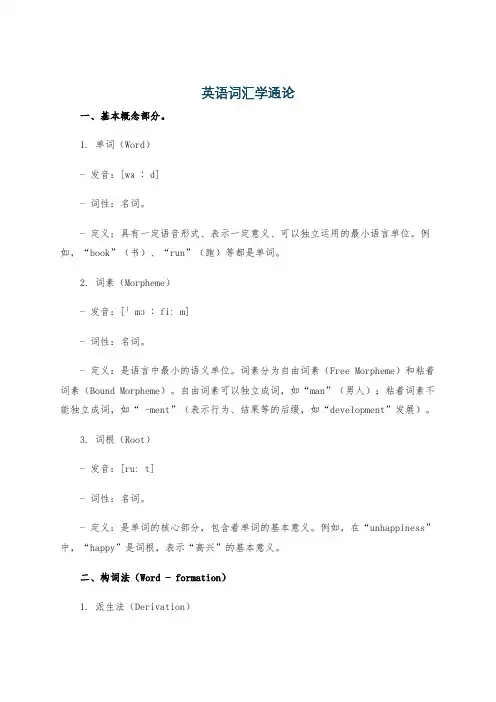
英语词汇学通论一、基本概念部分。
1. 单词(Word)- 发音:[wɜːd]- 词性:名词。
- 定义:具有一定语音形式、表示一定意义、可以独立运用的最小语言单位。
例如,“book”(书)、“run”(跑)等都是单词。
2. 词素(Morpheme)- 发音:[ˈmɔːfiːm]- 词性:名词。
- 定义:是语言中最小的语义单位。
词素分为自由词素(Free Morpheme)和粘着词素(Bound Morpheme)。
自由词素可以独立成词,如“man”(男人);粘着词素不能独立成词,如“ -ment”(表示行为、结果等的后缀,如“development”发展)。
3. 词根(Root)- 发音:[ruːt]- 词性:名词。
- 定义:是单词的核心部分,包含着单词的基本意义。
例如,在“unhappiness”中,“happy”是词根,表示“高兴”的基本意义。
二、构词法(Word - formation)1. 派生法(Derivation)- 发音:[ˌderɪˈveɪʃn]- 词性:名词。
- 解释:通过在词根上加前缀(Prefix)或后缀(Suffix)来构成新词的方法。
- 示例:- 加前缀:“un -”(表示否定) + “happy”(高兴的) = “unhappy”(不高兴的),“un -”的发音是[ʌn]。
- 加后缀:“teach”(教)+“ -er”(表示人) = “teacher”(教师),“ -er”的发音是[ə(r)]。
2. 合成法(Compounding)- 发音:[kəmˈpaʊndɪŋ]- 词性:名词。
- 解释:把两个或两个以上的词组合成一个新词的方法。
- 示例:- “black”(黑色的)+“board”(木板) = “blackboard”(黑板),“black”发音为[blæk],“board”发音为[bɔːd]。
- “day”(天)+“break”(打破,破晓) = “daybreak”(黎明),“day”发音为[deɪ],“break”发音为[breɪk]。
英语词汇学知识点总结
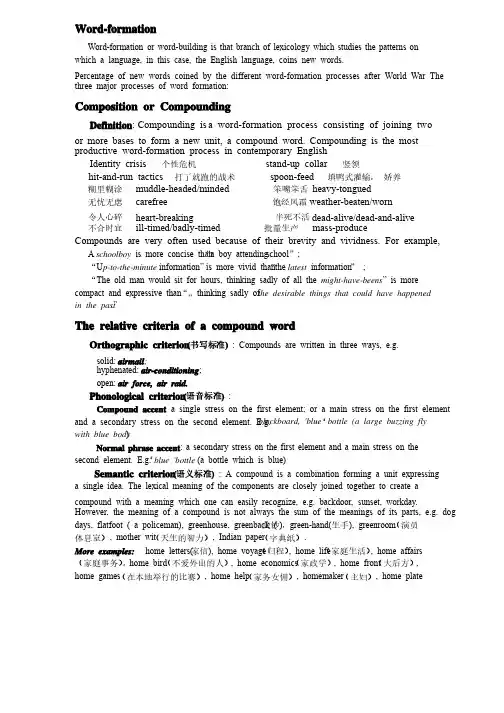
Word-formationWord-formation Word-formation or or or word-building word-building word-building is is that that branch branch branch of of of lexicology lexicology lexicology which which which studies studies studies the the the patterns patterns patterns on on which a language, in this case, the English language, coins new words. Percentage of new words coined by the different word-formation processes after World War The three major processes of word formation: Composition or CompoundingDefinition : Compounding is a word-formation process consisting of joining two or or more more more bases bases bases to to to form form form a a a new new new unit, unit, unit, a a a compound compound compound word. word. word. Compounding Compounding Compounding is is is the the the most most productive word-formation process in contemporary English . Identity crisis 个性危机stand-up collar 竖领hit-and-run tactics 打了就跑的战术spoon-feed 填鸭式灌输,娇养糊里糊涂muddle-headed/minded 笨嘴笨舌heavy-tongued 无忧无虑carefree 饱经风霜weather-beaten/worn 令人心碎heart-breaking 半死不活dead-alive/dead-and-alive 不合时宜ill-timed/badly-timed 批量生产mass-produce Compounds are very often used because of their brevity and vividness. For example, A schoolboy is more concise than “a boy attending school ”; “U p-to-the-minute information information” ” is more vivid than “the latest information ”; “The The old old old man man man would would would sit sit sit for for for hours, hours, hours, thinking thinking thinking sadly sadly sadly of of of all all all the the might-have-beens ” ” is is is more more compact and expressive than “…thinking sadly of the desirable things that could have happened in the past .”The relative criteria of a compound wordOrthographic criterion (书写标准) : Compounds are written in three ways, e.g. solid: airmail ;hyphenated: air-conditioning ; open: air force, air raid.Phonological criterion (语音标准) : Compound accent: a single stress on the first element; or a main stress on the first element and a secondary stress on the second element. E.g. 'blackboard, 'blue ‘bottle (a large buzzing fly with blue body ) ) Normal phrase accent : : a a a secondary secondary secondary stress stress stress on on on the the the first first first element element element and and and a a a main main main stress stress stress on on on the the second element. E.g. ‘ blue 'bottle (a bottle which is blue) Semantic criterion (语义标准) : A compound is a combination forming a unit expressing a a single single single idea. idea. idea. The The The lexical lexical lexical meaning meaning meaning of of of the the the components components components are are are closely closely closely joined joined joined together together together to to to create create create a a compound compound with with with a a a meaning meaning meaning which which which one one one can can can easily easily easily recognize, recognize, recognize, e.g. e.g. e.g. backdoor, backdoor, backdoor, sunset, sunset, sunset, workday. workday. However, the meaning of a compound is not always the sum of the meanings of its parts, e.g. dog days, flatfoot ( a policeman), greenhouse, greenback (美钞),green-hand(生手), greenroom (演员休息室), mother wit (天生的智力), Indian paper (字典纸). More examples:home letters(家信), home voyage (归程), home life (家庭生活), home affairs (家庭事务),home bird (不爱外出的人)(不爱外出的人), home economics (家政学), home front (大后方), home games (在本地举行的比赛), home help (家务女佣)(家务女佣), homemaker (主妇)(主妇), home plate(棒球的本垒打), home sickness (思家病)(思家病). Word order: A flower pot (花盆) a pot flower (盆花) tiptoe(脚尖) deaf-mute (聋哑者)(聋哑者)Some of them were influenced by French : court martial(军事法庭) ; president elect (当选总统); ambassador designate (尚未上任的大使)(尚未上任的大使)Classification of compoundsCompounds can be classified according to parts of speech of the compounds . noun compounds : airplane , flower potadjective compounds: w eather-beaten weather-beaten , snowwhite verb compounds: p roof-read, proof-read, baby-sit proposition compounds: notwithstanding, alongside of conjunction compounds : whenever ,whereas pronoun compounds: a nother another , myselfThe three commonest types are noun compounds, adjective compounds, andverb compounds.noun compounds• Noun + nounrainwater 雨水; ; springwater springwater 泉水; ; houseplants houseplants 室内植物;fireball 火球火球 ; ; firecracker firecracker 鞭炮 ; spacecraft/spaceship 太空船;spacesuits 太空服;mousemat ; 鼠标垫鼠标垫 Dream Team ;bar code 条形码;条形码; lip service 口头上说得好听的话;口头上说得好听的话; information highway 信息高速公路; science fiction 科幻小说;科幻小说; sugar cane 甘蔗;gaslight 煤气灯;煤气灯;• Noun + verbdaybreak 拂晓; nightfall 夜幕降临;sunset/sunrise 日落, earthquake 地震;landslip/landslide (山体滑坡); headache toothache ;stomachache ;heartbeat drumbeat ; footbeat 脚步节拍 ; wingbeat 翅翼振动 ; window-dress 布置橱窗;布置橱窗; water-supply 自来水自来水 ; snowfall 降雪量; toothpick 牙签;牙签; haircut ; pickpocket ; scarecrow 稻草人稻草人 ( scare the crow) • V erb + noun cry baby (爱哭的婴儿); playboy (花花公子) ;glowworm (发光虫); watch-dog (看家狗), swearword (骂人话), breakwater (防波提)(防波提), driveway (车道), jump suit (伞兵跳伞服,连衣裤工作服);rattle snake(响尾蛇响尾蛇) • V erb + adv / prep changeover (转变进程) ; setback (挫折挫折); breakdown (崩溃), show-off(炫耀), slip-up(疏忽,不幸事故), put-off (推迟,搪塞), follow-up (连续广告法)(连续广告法)sit-in, dropout, breakdown, walk-on, walkout, setback, take-off• Adjective + nounclear-way(超速道路), easy-chair, deadline, hard disk, soft disk ,red tape(官样文章官样文章) • adverb + noununder-clothes(内衣), after-effect (后效,副作用)(后效,副作用), upgrade(升级), overburden • V+ing + nounchewing gum(口香糖), baking powder (发酵粉), reading lamp (台灯), lodging house (分间出租供人休息用的房屋),leading article(社论), working party (作业队)(作业队)• Adverb + verb outlet(出口), upset (颠覆)(颠覆), downfall (垮台,陷落)(垮台,陷落), upstart (暴发户)(暴发户), onflow (滚滚向前)前)adjective compounds• Pre-modifier VS. Post-modifier Post-modifier ( ( ( describe describe describe a a a noun noun noun phrase phrase phrase or or or restrict restrict restrict its its its meaning meaning meaning in in some way) • Compound modifiers, because of their expressiveness and brevity, are used quite flexibly in current English, especially in journalistic writings. • noun + adjective• skin-hungry, power-hungry, news-hungry, career-hungry (急于成名的) , bloodthirsty • duty-free, tax-free, fat-free, toll-free, maintenance-free, dust-free, interest-free, care-free, ice-free, danger-free, nuclear-weapon-free • water-proof, fire-proof, bullet-proof, rain-proof, bomb-proof, vibration-proof • air-sick, seasick, car-sick, home-sick, heartsick (沮丧的) • user-friendly, reader-friendly • profit-conscious,time-conscious, class-conscious, environment-conscious, security-conscious • slap-happy(被打得晕头转向的) boxer , trigger-happy (嗜杀成性的)gangster , travel-happy(对旅游入迷的) • accident-prone, crisis-prone (危机四伏的),error-prone, • air-tight(不透气的),water-tight, light-tight(不透光的), rain-tight • work-shy(不愿工作的),camera-shy(怕上镜头的), publicity-shy (不愿出头露面的) • color-blind, night-blind • blood-weary (厌战的),travel-weary(旅途劳累的) •stone-deaf, skin-deep, snow-white, ice-cold, knee-deep, paper-thin, mirror-bright, feather-light, fire-hot, crystal-clear, waist-high, shoulder-high, life-long, grass-green, dog-tired, threadbare (穿旧的)(穿旧的) • college-bound/preparatory (准备考大学的),labor-short (缺乏劳动力的),top-heavy(头重脚轻的),penny-wise(小事聪明的) , oven-fresh (刚出炉的) line-dry(一晾就干的一晾就干的),world-famous • adjective + adjectivewet-cold, wet-cold, icy-cold, icy-cold, icy-cold, red-hot, red-hot, red-hot, white-hot, white-hot, white-hot, bitter-sweet, bitter-sweet, bitter-sweet, deaf-mute, deaf-mute, deaf-mute, shabby-genteel(shabby-genteel(穷酸的),dead-alive(半死不活的),dark-blue, dark-blue, deep-blue, deep-blue, deep-blue, light-blue, light-blue, light-blue, pale-blue, pale-blue, pale-blue, bright-red, bright-red, bright-red, bloody-red, bloody-red, yellow-green, yellowish-green ,social-political• V+ing + adjectivesteaming-hot/smoking-hot steaming-hot/smoking-hot ((滚烫的,热气腾腾的),soaking-wet/wringing-wet(湿淋淋的,湿得可拧出水来的),biting-cold/freezing-cold (冷得刺骨的,冰冷的) • Adverb/Prep + adjectiveever-victorious (战无不胜的),over-cautious, all-round (全面的全面的), far-reaching (深远的,广泛的),evergreen (tree), wide-awake (机警的),over-sensitive, over-anxious, under-ripe (不成熟的),too-rapid • noun +V+ingpeace-loving, time/space/energy/labor-saving, time-consuming, summer-flowering(夏季开花的), ocean-going (远洋的), fault-finding, record-breaking, heart-breaking, hair-raising, side-splitting (令人捧腹的),thirst-quenching (解渴的),man-eating• noun + V+edheart-felt(衷心的), air-born (空降的,(空降的,空运的), home-made, travel-worn (旅行得疲乏的), hen-pecked, book-filled, poverty-stricken, weather-beaten, thunder-struck, suntanned • adjective/adverb + V+ingfresh-frozen(速冻的), easy-going(随和的), familiar-sounding (听起来熟悉的),hard-working, ever-lasting (永恒的) • adjective/adverb + V+ednewly-developed, well-balanced, far-fetched (牵强附会的),half-baked(烤得半生不熟的,肤浅的), hard-won (来之不易的),quick-frozen (速冻的), new-laid (eggs), so-called, fresh-caught, newly-built, well-informed, well-organized • noun + Noun+edhot-tempered(急性子的),chicken-hearted (胆怯的,软弱的),honey-mouthed, paper-backed (平装本的), eagle-eyed(目光尖锐地) • adjective/adv. + Noun+edshort-sighted, short-sighted, tender-hearted, tender-hearted, tender-hearted, sweet-hearted(sweet-hearted(性情温和的), ), green-fingered(green-fingered(擅长园艺的),open-handed, single-handed, bald-headed, empty-headed, hot-headed, kind-hearted, light-hearted, whole/half-hearted, absent-minded, narrow/broad-minded, double-faced, straight-faced, blue-eyed, muddle-minded/headed muddle-minded/headed ((糊里糊涂) ) , , , commercially-minded, commercially-minded, commercially-minded, heavy-tongued heavy-tongued heavy-tongued ((笨嘴笨舌的),middle-aged, middle-aged, cold-blooded, cold-blooded, cold-blooded, strong-bodied, strong-bodied, strong-bodied, rosy-cheeked, rosy-cheeked, rosy-cheeked, apple-cheeked, apple-cheeked, apple-cheeked, close/tight-fisted(close/tight-fisted(吝啬的), bare-footed, white-haired, high-heeled, ill-intentioned, weak-kneed (易屈服的),long-legged, close/tight-lipped (嘴紧的), ill-mannered, thick/thin-skinned (脸皮厚/薄),high-spirited, iron-willed, iron-willed, quick/short/slow/bad-tempered, quick/short/slow/bad-tempered, quick/short/slow/bad-tempered, glib-tongued glib-tongued glib-tongued ((油嘴滑舌的),loose-tongued(嘴不严的) • adjective + Nounlong-distance, full-length (未删节的),white-collar, red-letter(喜庆的), ,full-time, first-rate, high-speed, high-level, low-frequency, left-hand, real-time(实时的), long-range, deep-sea (fish) • Verb + Nounbreak-neck (危险的), telltale(搬弄是非的), cut-rate (减价的,次等的减价的,次等的)• Phrases or sentencesat-risk (处境危险的), in-your-face (明目张胆的), devil-may-care(不顾一切的), dog-eat-dog (狗咬狗的), round-the-clock, on-the-spot, cards-on-the-table, matter-of-fact, never-to-be-forgotten, once-in-a-life-time, off-the-cuff (临时想起的意见)opinion, back-up (备用) a stand-up collar (竖领), a walk-in closet (走入式大壁橱),a see-through shirt (透明的衬衫)(透明的衬衫)(透明的衬衫) take-home pay ,cross-border raid ,a keep-fit class (保健班)(保健班)(保健班) verb compoundsThe common way to form a compound verb is by means of back-formation. The back-formation back-formation is is is a a a process process process of of of word word word formation formation formation by by by which which which a a a word word word is is is created created created by by by dropping dropping dropping the the supposed or imagined affixes Housekeeping → housekeep, test-drive(试车),machine-gun, nickname, spotlight, honeymoon, honeymoon, outline, outline, outline, speed-read, speed-read, speed-read, soft-land, soft-land, soft-land, vacuum-clean, vacuum-clean, vacuum-clean, mass-produce, mass-produce, mass-produce, sight-see, sight-see, sight-see, proof-read, proof-read, tape-record, chain-smoke, ghost-write, air-condition, baby-sit, window-shop, spoon-feed, hen-peck, snowball, middle-road(走中间道路), chain-react, face-harden(使表面硬化), wire-pull (幕后操纵),daydream, skyrocket, sleepwalk, highlight, safeguard, whitewash, sweet-talk,job-hop A compound verb can also be formed by means of analogy1.chain-drink: from chain-smoke 2.bottle-feed: feed from a bottle. from breast-feed:• feed from a mother's breast A compound verb can also be formed by means of verb phrasesoverwork, withhold(扣留), cross-question(盘问),upbuild (建立建立), uplift, uproot, fast-talk(花言巧语地企图说服),off-load(卸货),outeat(吃得比……多),outgo, outgrow , ill-treat, overhear, overtake, undergo, underline, undermine, undertake, Affixation or DerivationIt is a process of forming new words by the addition of a word element, such as a prefix, suffix, or combining form, to an already existing word. A combining form is a bound morpheme, which was originally a full word in Latin or Greek, such as auto-(from GK a utosautos self). 据统计下列14个词根和20个词缀出现在词典里10,000多个英语单词中词根词前缀前缀 词根Precept pre- (before) capere (take, seize) detain de- (away, from) tenere (hold, have) intermittent inter- (between) mittre (send) offer ob- (against) ferre (bear, carry) Insist in- (into) stare (stand) monograph mono- (alone, one) graph (write) epilogue epi (upon) egein (say, study) 词根词前缀前缀 词根aspect ad- (to, toward) spicere (see) com- (together) plicare (fold) uncomplicated un- (not); c omnonextended non- (not); e x ex- (out of) tendere (stretch) reproduction re- (back, again); pro- (forward) ducere (lead) dis- (apart from) ponere (put, place) indisposed in- (not); d isoversufficient over - (above); s ub sub - (under) facere (make, do) mistranscribe mis - (wrong); t rans trans - (across) scribere (write) Number-related prefixes from Latin prefix meaning examples uni- one uniform duo- two duet (二重唱二重唱/奏)奏) tri- three trio (三人组)三人组)三人组) quad-, quart- four quadruplets (四胞胎)四胞胎)四胞胎) quint- five quintuplets sext six sexet (六人组)六人组)六人组) sept seven september (7th month, Roman calendar) oct- eight october nona nine nonagenarian (90-99岁的人)岁的人)Number-related prefixes from Latin deca- ten decade cent- hundred centigrade (一百度的)一百度的)一百度的) multi- many multiply prim-, prin- first primary secund second secondary ambi both (双)双)双) ambivalent (两种价值观的,有矛盾心理的)两种价值观的,有矛盾心理的) equi- equal equidistant (等距离的)等距离的)等距离的) omni- all omnipotence (全能)全能) semi-, sem half semester (half a year 学期)学期)demi- half demitasse (half a cup for serving coffee (一小杯清咖啡)一小杯清咖啡)Number-related prefixes from Greek prefix meaning examples Mono- one monologue duo-, di- two dialogue tri- three triangle tetra- four tetrameter (四音步诗)四音步诗) penta- five pentameter ,pentagon hexa- six hexagon hepta- seven heptagon deka-, dec- ten decathlon hemi- half hemisphere pan- all pandemic (大流行病)大流行病)I.Prefixation The definition of prefixation Prefixation Prefixation is is is the the the formation formation formation of of of new new new words words words by by by adding adding adding prefixes prefixes prefixes to to to stems. stems. stems. Prefixes Prefixes Prefixes do do do not not generally change the word-class of the stem but only modify its meaning. However, there is an insignificant number of class-changing prefixes Non-class-changing prefixes: n atural-unnatural, like-dislike, fair-unfair natural-unnatural, like-dislike, fair-unfairClass-changing prefixes: force-enforce, danger-endanger , form-deform, little-belittle, war-postwar, college-intercollegeThe classification of prefixes In some reference books, prefixes (and suffixes) are classified according to their source, but this does not seem to help from a practical point of view. view. It seems It seems more helpful to classify the most important productive prefixes by their meaning into the following ten categories: The most productive prefixesPrefixes which are negative a-, dis-, in-, non-, un- Prefixes which are reversative or privative de-, dis-, un- Prefixes which are pejorative mal-, mis-, pseudo-Prefixes which are of degree or size arch-, arch-, extra-, extra-, extra-, hyper-, hyper-, hyper-, macro-, macro-, macro-, mini-, mini-, mini-, out-, out-, out-, over-, over-, sub-, super, sur-, ultra-, under- Prefixes which are of attitude anti-, co-, contra- counter-, pro- Prefixes which are locative extra-, fore-, inter-, intra-, super-, tele-, trans-, Prefixes which are of time and order ex-, fore-, pre-, post-, re- Prefixes which are of number semi-, uni-, mono-, bi-, di-, tri-, multi-, poly- Prefixes which are of a miscellaneous category Auto-, neo- pan-, proto-, vice-1.Negative prefix a-/an- amoral, asexual, atheism, anacid, anarchy, dis- dishonest, discontent, disobey, disagree in- Incomplete, Incomplete, inconsistent, inconsistent, inconsistent, incorrect, incorrect, incorrect, invulnerable, invulnerable, invulnerable, illogical, illogical, illogical, illegal, illegal, impolite, immoral, imbalance, irrational, irregular non- nonviolent, non-cooperation, nonautomatic, nonadjustable, nonalcoholic un- uninformative, unexpected, unease, unrest 2.Reversative or privative prefix 含“消除”意思意思 de- defrost, deregulation, degeneration, denationalize ,dehydrate depollute, devalue, decentralize un- undo, unpack, untie, unwrap, unmask dis- disconnect, dishearten, disinterested(公正的,无私的), disambigulate 3.Pejorative prefix mis- misguide, misapplication, misbehavior, mischoice, mal- maladjustment, maldigestion, malfunction, maldevelopment,maltreat, malodorous, malnutrition pseudo- pseudonym, pseudoscience, pseudoclassic, pseudo-friend, pseudodemocratic, 4) Prefixes of degree or size hyper- hyperactive, hypercritical, hyperaggressive, hypercautious ultra- ultramodern, ultrasecret, ultraclean, ultrasonic, ultraconservative mini- minibus, minicamera, miniskirt out- outdo, outgrown, outlive over- overwork, overestimate, overemphasize, overabundance, overburden under- underdeveloped, underpopulation, undergraduate super- supermarket, superpower, superstar sub- subadult, subtitle, subbreed, subatom 5) Prefixes of orientation and attitude co- Co-author, co-star, co-prosperity, cooperation counter- Counterexample, counterclaim, counteractive, counterattack, counterculture, counterpart anti- anti-abortion, anti-art, antiwar, antibacterial, antisocial, anticancer, antibody pro- pro-American, pro-American亲美的, pro-Communist, pro-student, proslavery 6) Locative prefixes fore- forearm, forehead inter- international, intergovernmental, interdisciplinary, intercollege trans- transatlantic, transoceanic, transform, transplant tele- telephone, telegram, telecommunication U.S. intercontinental missile洲际导弹洲际导弹 是指射程在8000千米以上的导弹。
英语词汇学知识点整理
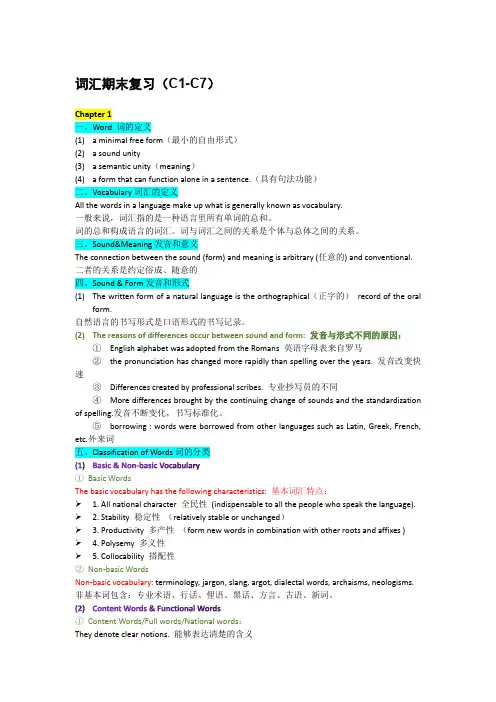
词汇期末复习(C1-C7)Chapter 1一、Word 词的定义(1) a minimal free form(最小的自由形式)(2) a sound unity(3) a semantic unity(meaning)(4) a form that can function alone in a sentence.(具有句法功能)二、Vocabulary词汇的定义All the words in a language make up what is generally known as vocabulary.一般来说,词汇指的是一种语言里所有单词的总和。
词的总和构成语言的词汇。
词与词汇之间的关系是个体与总体之间的关系。
三、Sound&Meaning发音和意义The connection between the sound (form) and meaning is arbitrary (任意的) and conventional. 二者的关系是约定俗成、随意的四、Sound & Form发音和形式(1)The written form of a natural language is the orthographical(正字的)record of the oralform.自然语言的书写形式是口语形式的书写记录。
(2)The reasons of differences occur between sound and form: 发音与形式不同的原因:①English alphabet was adopted from the Romans 英语字母表来自罗马②the pronunciation has changed more rapidly than spelling over the years. 发音改变快速③Differences created by professional scribes. 专业抄写员的不同④More differences brought by the continuing change of sounds and the standardization of spelling.发音不断变化,书写标准化。
词汇学复习资料
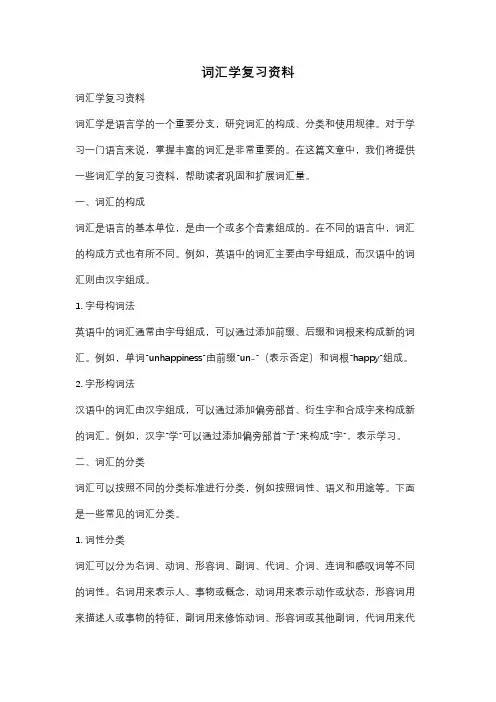
词汇学复习资料词汇学复习资料词汇学是语言学的一个重要分支,研究词汇的构成、分类和使用规律。
对于学习一门语言来说,掌握丰富的词汇是非常重要的。
在这篇文章中,我们将提供一些词汇学的复习资料,帮助读者巩固和扩展词汇量。
一、词汇的构成词汇是语言的基本单位,是由一个或多个音素组成的。
在不同的语言中,词汇的构成方式也有所不同。
例如,英语中的词汇主要由字母组成,而汉语中的词汇则由汉字组成。
1. 字母构词法英语中的词汇通常由字母组成,可以通过添加前缀、后缀和词根来构成新的词汇。
例如,单词“unhappiness”由前缀“un-”(表示否定)和词根“happy”组成。
2. 字形构词法汉语中的词汇由汉字组成,可以通过添加偏旁部首、衍生字和合成字来构成新的词汇。
例如,汉字“学”可以通过添加偏旁部首“子”来构成“字”,表示学习。
二、词汇的分类词汇可以按照不同的分类标准进行分类,例如按照词性、语义和用途等。
下面是一些常见的词汇分类。
1. 词性分类词汇可以分为名词、动词、形容词、副词、代词、介词、连词和感叹词等不同的词性。
名词用来表示人、事物或概念,动词用来表示动作或状态,形容词用来描述人或事物的特征,副词用来修饰动词、形容词或其他副词,代词用来代替名词,介词用来表示位置、时间或方式,连词用来连接词语或句子,感叹词用来表示强烈的情感。
2. 语义分类词汇可以按照词义的相似性进行分类。
例如,可以将名词按照人、动物、植物、物体、抽象概念等进行分类;将动词按照行为、状态、感觉、思维等进行分类;将形容词按照颜色、大小、形状、性质等进行分类。
3. 用途分类词汇可以按照在句子中的作用进行分类。
例如,可以将词汇分为实词和虚词。
实词包括名词、动词、形容词和副词,它们在句子中起到实际的意义;虚词包括代词、介词、连词和感叹词,它们在句子中起到连接或修饰的作用。
三、词汇的使用规律词汇的使用规律是指在特定语境中使用词汇的约束条件。
不同的语言和不同的语境中,词汇的使用规律也有所不同。
英语词汇知识点归纳
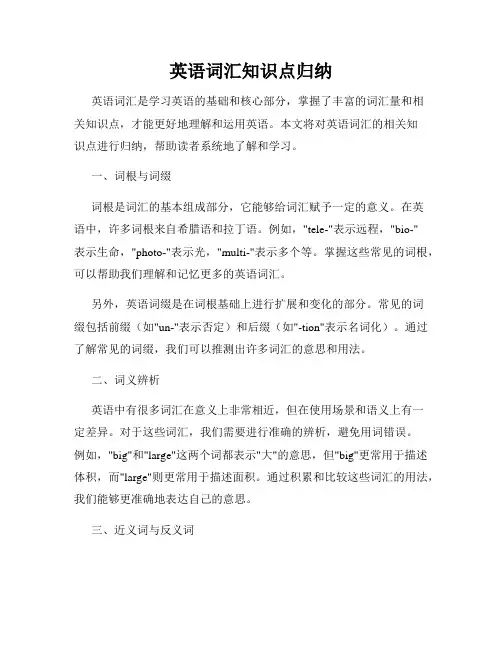
英语词汇知识点归纳英语词汇是学习英语的基础和核心部分,掌握了丰富的词汇量和相关知识点,才能更好地理解和运用英语。
本文将对英语词汇的相关知识点进行归纳,帮助读者系统地了解和学习。
一、词根与词缀词根是词汇的基本组成部分,它能够给词汇赋予一定的意义。
在英语中,许多词根来自希腊语和拉丁语。
例如,"tele-"表示远程,"bio-"表示生命,"photo-"表示光,"multi-"表示多个等。
掌握这些常见的词根,可以帮助我们理解和记忆更多的英语词汇。
另外,英语词缀是在词根基础上进行扩展和变化的部分。
常见的词缀包括前缀(如"un-"表示否定)和后缀(如"-tion"表示名词化)。
通过了解常见的词缀,我们可以推测出许多词汇的意思和用法。
二、词义辨析英语中有很多词汇在意义上非常相近,但在使用场景和语义上有一定差异。
对于这些词汇,我们需要进行准确的辨析,避免用词错误。
例如,"big"和"large"这两个词都表示"大"的意思,但"big"更常用于描述体积,而"large"则更常用于描述面积。
通过积累和比较这些词汇的用法,我们能够更准确地表达自己的意思。
三、近义词与反义词除了词义的辨析外,英语中还存在许多近义词和反义词。
近义词指的是意思相近但用法略有差异的词汇;反义词则指的是意义完全相反的词汇。
例如,"happy"和"joyful"就是近义词,"happy"强调一种普通的快乐,而"joyful"则强调更加强烈和欢乐的感觉。
"happy"的反义词是"sad","joyful"的反义词则是"sorrowful"。
2023年自考00832英语词汇学考试重点精华整理
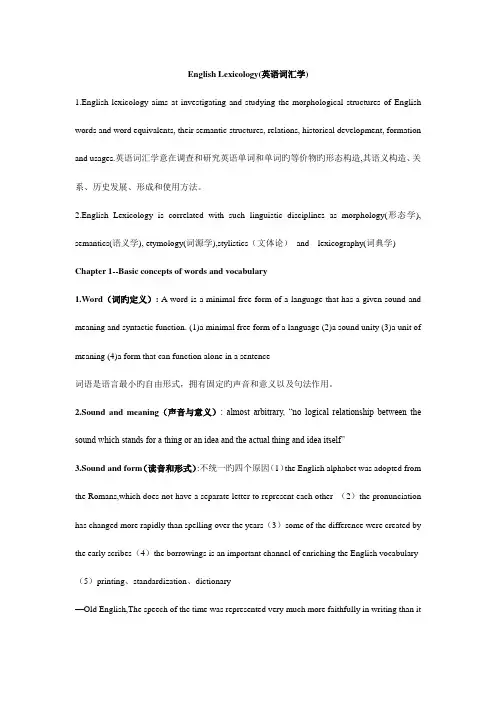
English Lexicology(英语词汇学)1.English lexicology aims at investigating and studying the morphological structures of English words and word equivalents, their semantic structures, relations, historical development, formation and usages.英语词汇学意在调查和研究英语单词和单词旳等价物旳形态构造,其语义构造、关系、历史发展、形成和使用方法。
2.English Lexicology is correlated with such linguistic disciplines as morphology(形态学), semantics(语义学), etymology(词源学),stylistics(文体论)and lexicography(词典学) Chapter 1--Basic concepts of words and vocabulary1.Word(词旳定义): A word is a minimal free form of a language that has a given sound and meaning and syntactic function. (1)a minimal free form of a language (2)a sound unity (3)a unit of meaning (4)a form that can function alone in a sentence词语是语言最小旳自由形式,拥有固定旳声音和意义以及句法作用。
2.Sound and meaning(声音与意义): almost arbitrary, “no logical relationship between the sound which stands for a thing or an idea and the actual thing and idea itself”3.Sound and form(读音和形式):不统一旳四个原因(1)the English alphabet was adopted from the Romans,which does not have a separate letter to represent each other (2)the pronunciation has changed more rapidly than spelling over the years(3)some of the difference were created by the early scribes(4)the borrowings is an important channel of enriching the English vocabulary (5)printing、standardization、dictionary—Old English,The speech of the time was represented very much more faithfully in writing than itis today. 古代英语中旳口语比今天更忠实旳代表书面语—The written form of English is an imperfect representation of the spoken form。
英语词汇学知识点归纳总结
英语词汇学知识点归纳总结
1.词汇分类:英语词汇可以分为实词和虚词两大类。
实词包括名词、
动词、形容词和副词,是能独立存在并具有词义的词类;虚词包括冠词、
介词、连词、代词和助词,是不能独立存在或不具有词义的词类。
2.词根与词缀:英语词汇中有很多词根和词缀,词根是词的核心部分,词缀是附加在词根上的,可以改变词的词义、词性或词形。
3.词义:英语词汇的词义可以通过定义、同义词、反义词、上下义词
等方式进行描述和解释。
词义可以有直观意义、引申意义和隐喻意义等。
4.词汇建构:英语词汇的建构可以通过合成、派生、转化、缩略等方
式进行。
合成是通过将两个或多个词根组合成一个新词,派生是通过添加
前缀或后缀来构成新词,转化是通过改变词的词类来构成新词,缩略是通
过省略部分词组或词根来构成新词。
5.词汇变化:英语词汇的变化形式包括时态、语态、人称、数和比较等。
词汇的变化形式可以通过词形变化、语法变化和语义变化等方式进行。
6.外借词:英语词汇中存在大量的外借词,这些词汇主要来自拉丁语、希腊语、法语、德语等其他语言。
外借词在英语中经过适当的拼写、读音
和意义调整后被接受和使用。
7.同源词:英语词汇中存在一些同源词,这些词源于同一词根或词源,并在语音、形态或词义上有一定的相似性。
了解同源词可以帮助理解和记
忆词汇。
8.词汇扩展:英语词汇在发展的过程中会发生扩展,即一个词从最初的特定意义扩展到更广泛的意义。
词汇扩展可以通过引申、转义、隐喻等方式进行。
这些是英语词汇学中的一些主要知识点,通过对这些知识点的学习和理解,可以更好地掌握和应用英语词汇。
英语词汇学总结
Chapter 3Word Formation I词语结构13.1 Morphemes词素1. the morpheme is ‘ the smallest functioning unit in the composition of words’词素是“词语中最小的功能单位”。
2.Suffix:-ation:-tion, -sion, -ion.后缀:ation 的多变体,当它们有同样的意义和语法功能时它们属于同一个后缀3.Owing to different sound environment 因为存在不同的发生环境。
3.2 Allomorphs (语素变体)同质异晶,同质异象变体1.Morphemes are abstract units.‘They are actual spoken, minimal carriers of meaning’语素是抽象的单位,它们实际上是能发音的最小的意义载体.The morpheme is to the morph what a phoneme is to a phone:语素是一个音素发音的形素①single morphs单一语素词:bird, tree, green, sad, want, desire,Most morphemes are realized by single morphs,Words of this kind are called monomorphemic words.大多数语素通过单个的形素实现,语素与词相同叫做单一语素词.These morphemes coincide withe words as they can stand by themselves and function freely in a sentence.Words of this kind are called monomorphemic words.这些语素与词相同,由于它们能代表含义而且能够在句子中自由起作用。
词汇学知识点总结
词汇学知识点总结词汇学是语言学的一个重要分支,研究的是词汇的形成、结构和意义等方面的问题。
在学习英语等外语的过程中,词汇是其中一个重要的组成部分。
下面,本文将对词汇学的一些知识点进行总结与归纳。
一、词的形态学词的形态学是词汇学中必须掌握的一个重要方面,主要包括词的构词法、屈折变化和派生变化等。
词的构词法指的是如何通过组合原有的词来创造新词,包括派生法、合成法、缩略法、转化法等。
屈折变化指根据语法要求,变化词的形态以表示不同的格、时、数、性等。
派生变化则指通过在原有词基础上添加字母或词缀等来产生新的词。
掌握词的形态学是很有必要的,因为它和词汇的理解和使用密切相关。
二、词的分类在英语中,词可以根据其不同的语法特征被归为不同的类别,常见的类别包括名词、代词、动词、形容词、副词、介词、连词和感叹词等。
不同的词在句子中扮演着不同的角色,掌握各类别之间的区别以及它们在句子中的作用,可以帮助我们更好地理解和表达语言。
三、词义词义是从语言学的角度定义词的意义,包括原义和引申义。
原义指的是一个词最基本的意思,而引申义则是在原义基础上经过延伸、扩展而得到的新意义。
同一个词的不同意义和语言环境等也会导致其含义的变化,例如“bank”既可以表示银行,也可以表示河岸等。
在学习外语的过程中,掌握词义是十分重要的。
四、词汇的学习方法词汇的学习是英语学习中最基础也最重要的部分之一,因此选择适合自己的学习方法对于提高词汇量、扩大词汇面积至关重要。
常用的学习方法包括反复背诵、积累单词簿、整理词根词缀、阅读和听力等。
在学习方法上,以选择适合自己和有用的方法为主,同时注意与语言运用的联系,不断地推广和实践。
五、词汇的应用掌握了词汇学的知识和学习方法后,其实就迈出了学习英语的第一步。
在实际运用中,如何运用得当也是至关重要的环节。
为了提高语言的流利度,需要在口语和书面语两个方面加强实践,增强实际运用能力。
另外,可以较晚多在社交网络等平台上与外国人联系,使用所学的词汇,将知识应用到实际交流之中,效果更佳。
现代英语词汇学
现代英语词汇学一、词汇的构成(Word - formation)1. 词根(Root)- 定义:词根是单词的核心部分,它包含着单词的基本意义。
例如,“vis”在“visible”(可见的)、“vision”(视觉)和“visit”(参观)中是词根,其基本意义与“看”有关。
读音:[ruːt],词性:名词。
2. 前缀(Prefix)- 定义:加在词根前面,改变单词的意义。
例如,“un - ”在“unhappy”(不快乐的)中表示否定。
读音:[ˈpriːfɪks],词性:名词。
- 常见前缀及其意义:- “re - ”(再,又),如“rewrite”(重写)。
读音:[riː - ],词性:前缀。
- “pre - ”(在……之前),如“preview”(预习,预演)。
读音:[priː - ],词性:前缀。
3. 后缀(Suffix)- 定义:加在词根后面,改变单词的词性或意义。
例如,“ - er”在“worker”(工人)中表示“做……的人”。
读音:[ˈsʌfɪks],词性:名词。
- 常见后缀及其作用:- “ - ness”(构成名词,表示性质、状态),如“happiness”(幸福)。
读音:[nəs],词性:后缀。
- “ - ful”(构成形容词,表示充满……的),如“helpful”(有帮助的)。
读音:[fʊl],词性:后缀。
二、词性(Parts of Speech)1. 名词(Noun)- 定义:表示人、事物、地点、抽象概念等。
例如,“book”(书)、“city”(城市)、“love”(爱)。
读音:[naʊn],词性:名词。
- 名词的分类:- 可数名词(Countable Noun),如“apple”(苹果),有单复数形式。
- 不可数名词(Uncountable Noun),如“water”(水),一般没有复数形式。
2. 动词(Verb)- 定义:表示动作或状态。
例如,“run”(跑)、“be”(是)。
- 1、下载文档前请自行甄别文档内容的完整性,平台不提供额外的编辑、内容补充、找答案等附加服务。
- 2、"仅部分预览"的文档,不可在线预览部分如存在完整性等问题,可反馈申请退款(可完整预览的文档不适用该条件!)。
- 3、如文档侵犯您的权益,请联系客服反馈,我们会尽快为您处理(人工客服工作时间:9:00-18:30)。
词汇期末复习(C1-C7)Chapter 1一、Word 词的定义(1) a minimal free form(最小的自由形式)(2) a sound unity(3) a semantic unity(meaning)(4) a form that can function alone in a sentence.(具有句法功能)二、Vocabulary词汇的定义All the words in a language make up what is generally known as vocabulary.一般来说,词汇指的是一种语言里所有单词的总和。
词的总和构成语言的词汇。
词与词汇之间的关系是个体与总体之间的关系。
三、Sound&Meaning发音和意义The connection between the sound (form) and meaning is arbitrary (任意的) and conventional. 二者的关系是约定俗成、随意的四、Sound & Form发音和形式(1)The written form of a natural language is the orthographical(正字的)record of the oralform.自然语言的书写形式是口语形式的书写记录。
(2)The reasons of differences occur between sound and form: 发音与形式不同的原因:①English alphabet was adopted from the Romans 英语字母表来自罗马②the pronunciation has changed more rapidly than spelling over the years. 发音改变快速③Differences created by professional scribes. 专业抄写员的不同④More differences brought by the continuing change of sounds and the standardization of spelling.发音不断变化,书写标准化。
⑤borrowing : words were borrowed from other languages such as Latin, Greek, French, etc.外来词五、Classification of Words词的分类①Basic WordsThe basic vocabulary has the following characteristics: 基本词汇特点:➢ 1. All national character 全民性(indispensable to all the people who speak the language). ➢ 2. Stability 稳定性(relatively stable or unchanged)➢ 3. Productivity 多产性(form new words in combination with other roots and affixes )➢ 4. Polysemy 多义性➢ 5. Collocability 搭配性②Non-basic WordsNon-basic vocabulary: terminology, jargon, slang, argot, dialectal words, archaisms, neologisms.非基本词包含:专业术语、行话、俚语、黑话、方言、古语、新词。
①Content Words/Full words/National words:They denote clear notions. 能够表达清楚的含义②Functional words/Empty words/Form words:They show the relation between notions. 显示了与概念之间的关系①Native Words:Anglo-Saxon words brought by the Germanic tribes such as Angles, Saxons and the Jutes.②Borrowed Words:loan words or borrowings. English has adopted almost all the major languages in the world. It includes Denizens 同化词Aliens非同化词Translation loans 译借词Semantic loans 借义词Chapter 2一、The Indo-European Language Family印欧语系(1)The Indo-European language family is made up of most languages of Europe, the Near East,and India.印欧语系是由欧洲、近东和印度的大部分语言组成的。
(2)The classification of Indo-European language family :①The Eastern Set②The Western Set(Germanic)二、Three phases of the Vocabulary Development词汇发展三阶段(1)Old English(450-1150)特点:➢It has a small vocabulary of about 50,000 to 60,000 words. 词汇量小➢It has small number of borrowings came from Latin and Scandinavian.拉丁/斯堪的纳维亚外来词少➢It is a highly inflected language. (it has the words full of endings.)完整词尾(2)Middle English(1150-1500)特点:➢It has a comparatively large vocabulary;词汇量相对较大➢It has absorbed a tremendous number of foreign words mainly from French and Latin;吸收大量发育和拉丁词汇➢Word endings become leveled.词尾扁平(3)Modern English(1500 up to the present)特点:➢it has a huge and heterogeneous vocabulary; 巨大且多样的词汇➢It has tremendous borrowings; 许多外来词➢It has words with lost endings. 词尾消失三、General Characteristic一般特征(1)Receptivity, adaptability and heterogeneity接受性、适应性、异质性(2)Simplicity of inflection简洁性、屈折性(3)Relatively fixed word-order相对固定的语序四、Foreign Elements in the English Vocabulary英语词汇中的外来成分(1)主要外来成分:拉丁、希腊、法语、斯堪的纳维亚语(2)次要外来成分:意大利语、日耳曼语、荷兰语、西班牙和葡萄牙语、凯尔特语五、Growth of Contemporary English Vocabulary当代英语词汇的发展Modes of Vocabulary Development发展方式:➢Creation 创词Semantic change 旧词新义Borrowing 借词Chapter 3一、Morphemes词素(1)词素的定义:It is the smallest functioning unit in the composition of words.语素是最小的有意义的单位。
它是语言中最小的构词单位。
(2)词素的特点:①All the morphemes have their own meanings, but they cannot be further divided, otherwise they will not make any sense.所有的词素都有自己的意义;它们不能再细分了,否则将会没有任何意义。
②Morphemes may have some variants. 词素可能会有一些变。
e.g. - ation. May also be -tion, -sion,-ion, but they belong to the same suffix because they have the same meaning and grammatical function.二、Morphs and Allomorphs形素和词素变体(1)形素的定义:The phonetic or orthographic strings or segments which realize morphemes are termed ‘morphs’.体现词素的语音串和拼写字节被称为形素。
(2)形素与词素的关系:Morphemes are abstract units, which are realized in speech by discrete units known as morphs.词素是抽象的单位,是由分立的形素在话语中具体实现的。
(3)词素变体:An allomorph refers to a member of a set of morphs, which represent one morpheme.词素变体指一套形素中的一个成员,表征一个词素。
总结:语言中最小的不可再分的意义单位是词素。
morpheme又可称为形位、语素等。
词素是抽象的,它是通过形素morph表现出来的。
词素还有变体形式,在语言学中称为词素变体allomorph。
三、Classifying Morphemes词素分类(1)in terms of their capacity of occurring alone 根据能否独立出现分类Free vs. bound morphemes 自由词素/粘着词素➢Free morphemes(自由词素):Morphemes which are independent of other morphemes are free. Free morphemes have complete meanings in themselves and can be used as free grammatical units in sentences.自由词素是能独立运用的词素,它有完整的意义,在句中充当一个自由的语法单位。
